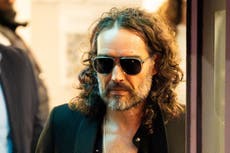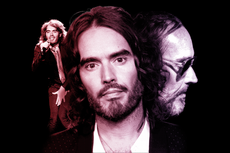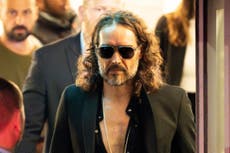Media bosses must be upfront about what they knew of Russell Brand’s alleged behaviour
Editorial: If Brand’s alleged conduct was ‘common knowledge’, why was it not tackled sooner? And what can be done to ensure it is not repeated in the future?

Rape, sexual assaults and emotional abuse. If there is one thing that may be agreed on about the allegations levelled against Russell Brand it is that they are very, very serious. Brand himself acknowledges their criminal dimension, while denying his actions were ever anything other than consensual.
In his “prebuttal” video, released some hours before the media published the distressing stories, Brand deployed some Trumpian lines of defence about a “coordinated media attack”, “like with Joe Rogan, when he dared to take a medicine that the mainstream media didn’t approve of”. Brand hints that his views on global politics and his new status, online and well away from television, radio and film, has thus made him a natural target.
His legal team are more explicit about “the fact that he is an alternative media broadcaster competing with mainstream media”. Brand pleads that: “The relationships I had were absolutely always consensual. I was always transparent about that then … I’m being transparent about it now as well. And to see that transparency metastasized into something criminal that I absolutely deny makes me question, is there another agenda at play?”
The short answer to that is that there is no other agenda “at play” – merely media organisations doing their usual job in the public interest. Brand is hardly the first; and he is no more persecuted than any other public figure who finds their alleged behaviour questioned. Indeed, that was notoriously the case while Brand was thriving in the mainstream broadcast media himself, at least until his (and Jonathan Ross’s) ghastly behaviour during “Sachsgate”.
The story will undoubtedly develop, whether or not it ever reaches a courtroom, or indeed anything resembling a conclusion. Other accusers may come forward, while Brand says there are “witnesses whose evidence directly contradicts the narratives that these two mainstream media outlets are trying to construct”. Brand has already experienced some professional setbacks from the allegations, though at least some of his audience and fanbase seem willing to support him. He also has the backing of those conspiracy theorists who automatically identify with him as being some sort of anti-authority figure, a victim of unnamed forces with an unnamed agenda. A sign of our times, perhaps.
The even less comfortable truth is that the mainstream media organisations most associated with Brand also have questions to answer about why they were so tolerant of “the talent” for so long. It does sound wearily familiar. Great credit does go to Channel 4, which used to make extensive use of Brand’s presentational skills, for voluntarily suffering the reputational damage as a result of broadcasting the searing accounts of alleged abuse in their Dispatches series. The normal, instinctive, institutional reaction in crises such as this – be it banks, corporations, political parties, churches, charities or the police, say – is to play down, deny and obfuscate. Not produce 90 minutes of self-excoriation.
Yet, the documentary alleged, the channel’s management were not completely transparent about their dealings with Brand, and perhaps did not exert enough influence or control they, as the commissioning company, had over production houses such as Endemol who made shows on their behalf.
The BBC, too, has to give a fuller account of itself. As by far the country’s biggest broadcaster, it necessarily ends up with awkward questions about the personalities it puts on the internet, the screen, and the airwaves. As a result, it is in an almost permanent state of firefighting about things in its staff or contributors’ private lives that it cannot possibly know about, let alone prevent. But the Jimmy Savile affair is also a constant reminder of the dangers of complacency, and the real human misery that can stem from ignoring warnings and rumours.
One of the interviewees in the Channel 4 documentary, a fellow comedian, attests to Brand’s alleged behaviour being “common knowledge” in the trade; and his on-screen excesses speak for themselves – not least an inexplicably awful broadcast interview with Savile. There are also many production staff at a variety of organisations associated with Brand who speak about his alleged ways – one claiming that they were in effect “pimps”. All such allegations are denied by Brand. His agents and publishers, some of whom have now severed their connections with the comedian, also need to say what they knew and when.
There may be some parliamentary scrutiny of these matters. Whether the whole truth will ever come out is questionable, but the more we learn, the better Brand’s culpability may be assessed – and the better placed our institutions will be to deal with accusations in future.



Join our commenting forum
Join thought-provoking conversations, follow other Independent readers and see their replies
0Comments